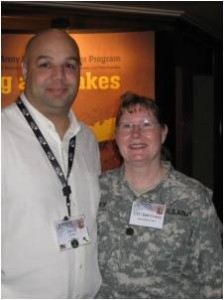–By Sarah Greer, AW2 Stratcom–
What’s Going on Here
The AW2 Symposium uses the Army Family Action Plan (AFAP) process as one way to elevate the AW2 top issues of concern to senior Army leadership. Over the last year, AW2 Soldiers, Veterans, and Family members have raised issues, and the Symposium delegates will narrow them down to the five of greatest concern to the AW2 population.
For the last four days, AW2 Symposium delegates have been narrowing down 70 issues submitted by AW2 Soldiers, Veterans, and Family members. Tomorrow, each of the five Symposium focus groups will present their top two issues to the rest of the delegates, WTC Commander BG Gary Cheek, AW2 Director COL Jim Rice, and AW2 Sergeant Major SGM Brent Jurgersen.
Delegates will then vote on their top five issues. Army-specific issues will move forward in the AFAP process, including action through the AFAP worldwide conference in January 2010. For issues involving other agencies, AW2 will use other appropriate avenues to bring the issues forward.
What is AFAP?
AFAP was founded 25 years ago by a group of spouses who felt Army leadership should hear from Family members on bases around the world. They conduct eight conferences, including the AW2 Symposium, throughout the year to prioritize issues submitted by Army Soldiers and Families. Each conference divides delegates into focus groups, which discuss and prioritize previously-submitted issues. At the annual AFAP worldwide conference, two issues from each event (including the AW2 Symposium) and two from OCONUS Army installations are selected to be presented to Army leadership. The issues are presented to the Army Chief of Staff, Vice Chief of Staff, and Sergeant Major of the Army, who assign them to relevant officers for action.
“AFAP issues have changed a lot over the years,” said Ronnie Thomas, AFAP’s representative at the AW2 Symposium.”I was one of the original spouses, and at the beginning, we focused on family support, relocation issues, and child care. Now, we see a lot more concern about the single Soldier, medical concerns, and specific populations, like wounded warriors.”
How does AW2 Use the AFAP Process?
“Using the AFAP process serves the AW2 population well,” said MAJ Deb Cisney, the AW2 Operations Officer charged with overseeing all aspects of the AW2 Symposium. “This is the Army’s official method for addressing Soldier and Family issues, and AFAP conferences highlight issues the Army doesn’t normally delve into, such as community and collaboration issues.”
“They’ve really learned how to support our Soldiers and Veterans, and we appreciate being able to work with the same people year after year,” she added. “The AFAP team also helps us track the issues throughout the year and identify subject matter experts and action officers.”
What’s So Special about an AW2 Symposium?
There are several differences between an AW2 Symposium and a regular AFAP conference.”We only have AW2 delegates,” said MAJ Cisney.”It’s almost as though AW2 is hosting an AFAP conference.” In addition, AW2 places an AW2 Advocate in each room to help gauge the needs of individual delegates. “AFAP has been incredibly supportive of AW2 and sensitive to our population,” said MAJ Cisney.
Ronnie has attended all five AW2 Symposiums and believes that AW2 has developed a great rhythm for working through the issues each year. “AW2 Symposium is different than the other AFAP conferences,” said Ronnie. “The issues are focused on this specific population, and the AFAP team has learned to accommodate Soldiers suffering from PTSD and TBIs.”
“For the first time, we’ve also placed an Advocate Mentor in each room,” added MAJ Cisney. These specific AW2 Advocates are all AW2 Soldiers or spouses themselves. “No one can do what they do, they’ve walked in our Soldiers’ shoes, and they can quickly determine what individual delegates need.”
Another difference between an AW2 Symposium and an AFAP conference is that AW2 sometimes assigns a specific issue to more than one group. “This helps us get different perspectives,” said MAJ Cisney.
This year, AFAP staff are more involved in the formatting process for the individual issue reports.” Army leadership looks for specific key words when deciding on the best course of action for an issue,” said MAJ Cisney. “The AFAP team knows how to phrase things so leadership gets a clear picture of the focus groups’ intent. They work closely with the groups to make sure the language still reflects their conversations.”
What Should AW2 Delegates Keep in Mind?
Ronnie had some great advice for Symposium delegates. “Be flexible and open,” she said. “Speak your mind and trust us – we really are here to help.”
AFAP staff also come away from Symposium with more respect for AW2 Soldier, Veterans, and spouses. “I am always inspired after an AW2 Symposium,” Ronnie added. “Every year, it is a life-changing experience. You see the resilience and strength in these Soldiers, and their devoted spouses. It helps me put my own life in perspective, my catastrophes become trivial when I hear these Soldiers talk about the challenges they overcome.”
“The resiliency of wounded warrior Families is incredibly powerful,” said Michelle Reilly, one of the focus group facilitators. “They’re here to tell their story, but also to improve the experience for Soldiers coming behind them.”






